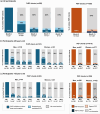Online delivery of oral HIV pre- and post-exposure prophylaxis: findings from the ePrEP Kenya pilot
- PMID: 40569864
- PMCID: PMC12231658
- DOI: 10.1002/jia2.26468
Online delivery of oral HIV pre- and post-exposure prophylaxis: findings from the ePrEP Kenya pilot
Abstract
Introduction: The expansion of telecommunication networks and smartphones in many African countries could be leveraged to deliver HIV prevention products directly to consumers. In collaboration with a private e-commerce platform and online pharmacy in Kenya, MYDAWA, we piloted a new model of HIV pre- and post-exposure prophylaxis (PrEP/PEP) delivery.
Methods: In the ePrEP Kenya pilot (NCT05377138), individuals living in Nairobi and Mombasa Counties could complete a free telehealth visit with a remote clinician to assess eligibility for online PrEP/PEP (i.e. ≥18 years; no medical contraindications). Eligible individuals could order HIV testing services-courier delivered to clients' choice location-for a fee of 250 KES (∼$2 USD) for self-testing or 150 KES (∼$1 USD) for provider-administered rapid diagnostic testing. Following confirmation of clients' HIV-negative status (via an uploaded test result image), free PrEP/PEP drugs from government supply were courier delivered with or separately from HIV testing services. Clients paid a delivery fee ≤149 KES (∼$1 USD) per courier visit.
Results: From October 2022 to December 2023, we screened 2257 individuals and enrolled 1915. Most PrEP/PEP clients were men (63%, 1428/1915), ≥25 years (72%, 1631/1915) and never married (80%, 1796/1915); few had ever used PrEP (3%, 48/1915) or PEP (14%, 263/1915). At enrolment, 227 (12%) were preliminarily eligible for PrEP and 1688 (88%) for PEP. Among PrEP-eligible clients, 89% (203/227) completed HIV testing and 92% (208/227) received PrEP; among PEP-eligible clients, 92% (1551/1688) completed HIV testing and 92% (1549/1688) received PEP. Most PrEP/PEP clients completed HIV testing within 6 hours of their telehealth visit (53%, 927/1757) and had drugs delivered with testing services (88%, 1546/1757). Among PrEP clients eligible for follow-up, 47% (120/256) continued PrEP and 4% (10/256) initiated PEP following PrEP discontinuation. Among PEP clients eligible for follow-up, 7% (99/1428) repeated PEP use and 6% (83/1428) transitioned from PEP to PrEP.).
Conclusions: Online PrEP/PEP delivery could expand access to prevention services by reaching individuals not engaged in existing delivery platforms. The uptake of online PEP was five times greater than PrEP, underscoring an unmet demand for PEP and highlighting the potential for online pharmacies to deliver time-sensitive PEP services.
Keywords: HIV prevention; HIV self‐testing; differentiated service delivery; online delivery; post‐exposure prophylaxis; pre‐exposure prophylaxis.
© 2025 The Author(s). Journal of the International AIDS Society published by John Wiley & Sons Ltd on behalf of International AIDS Society.
Conflict of interest statement
The authors declare no conflicts of interest.
Figures


References
-
- Holst C, Sukums F, Radovanovic D, Ngowi B, Noll J, Winkler AS. Sub‐Saharan Africa—the new breeding ground for global digital health. Lancet Digit Health. 2020;2(4):e160–e2. - PubMed
-
- GSMA Intelligence . The mobile economy sub‐Saharan Africa 2020 [Internet]. London: 2020. [cited 2024 May 28]. Available from: https://www.gsma.com/solutions‐and‐impact/connectivity‐for‐good/mobile‐e...
-
- GSMA Intelligence . The mobile economy sub‐Saharan Africa 2023 [Internet]. London: 2023. [cited 2024 May 28]. Available from: https://data.gsmaintelligence.com/api‐web/v2/research‐file‐download?id=7....
-
- International Trade Administration . The rise of eCommerce in Africa [Internet]. Washington, DC: 2024. [cited 2024 May 28]. Available from: https://www.trade.gov/rise‐ecommerce‐africa.
-
- Salient Advisory . Advancing access to essential health products via online pharmacies in Africa: Regulatory Landscaping Report [Internet]. Melbourne: 2023. [cited 2024 May 28]. Available from: https://www.salientadvisory.com/report‐media/online‐pharmacy‐in‐africa‐l....
Publication types
MeSH terms
Substances
Grants and funding
LinkOut - more resources
Full Text Sources
Medical
Miscellaneous

